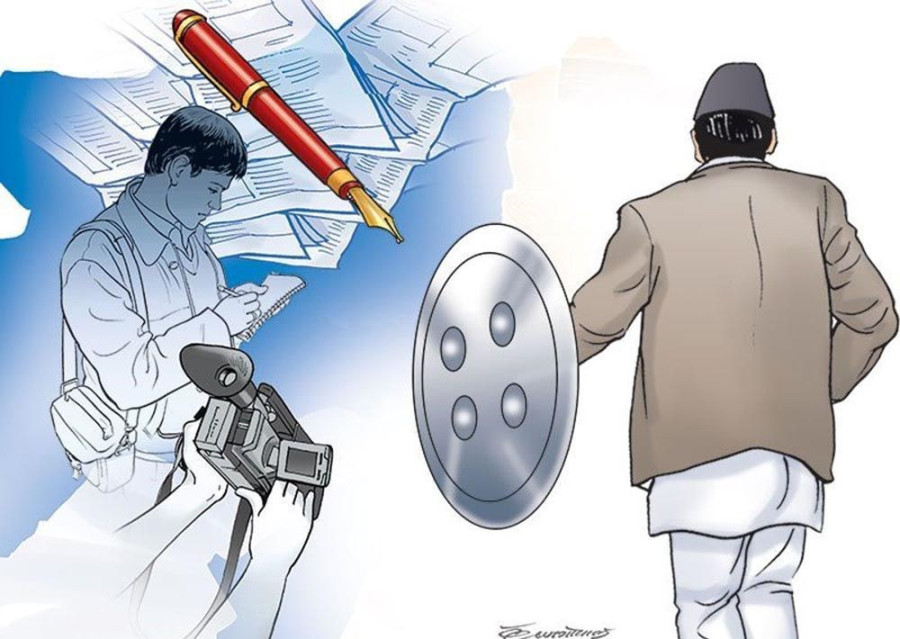National
Bill on public service broadcasting will curtail editorial freedom: Experts
Journalists’ body lobbies government, lawmakers to make legislation supportive of a true public broadcaster.
Tika R Pradhan
Endorsed by the National Assembly without any major change, the Public Service Broadcasting Bill (2020) that aims to merge Radio Nepal and Nepal Television is currently at the House of Representatives. Experts point out problems in the bill saying that the legislation, if passed as it is, would worsen the situation of public service broadcasting in the country.
Stakeholders and experts have been demanding that public service broadcasting (PSB) be made accountable to Parliament and be detached from the government, but the bill gives continuity to the government’s control over state-funded media.
A public broadcasting entity should have editorial independence, but the bill envisions a council governing the new broadcaster led by the communications minister or state minister for communication with secretaries as members.
“There are many provisions in the bill that undermine the actual spirit of public service broadcasting,” said Raghu Mainali, a broadcast media expert. “Lawmakers have a lot of work to do to make public service broadcasting a reality.”
Registered in the upper house on July 8, 2020, the Public Service Broadcasting Bill was endorsed by the assembly on April 4 after clause-wise discussions at the thematic committee.
However, no major changes were made to the original draft even as the previous sessions of the Assembly discussed the bill thoroughly in its thematic committee.
“I don’t think there has been any major change in the bill even after discussions at the parliamentary committee,” said Rajendra Phuyal, secretary of the National Assembly.
The bill envisions a council led by the minister or state minister of Communication and Information Technology and involving secretaries of various ministries and representatives of provincial governments, among others.
The 42-member council includes five secretaries, a representative of each provincial government, eight representatives from constitutional bodies and seven others nominated by the federal government.
Experts argue that the minister-led council with representatives from federal and provincial governments cannot honour the spirit of public service broadcasting.
“The term ‘public’ in public service broadcasting actually means people–who are served–but we translated it as ‘common’,” Mainali told the Post. A public service broadcaster must be independent and free of government interference or business influence, he added.
Mainali said the bill seems to be adopting a system that is practised nowhere in the world—a minister overseeing a public service broadcaster, rather than ensuring full editorial independence and autonomy.
“Three things are essential to ensure independence—appointment process, mandate and process to remove the authorities, besides financing,” Mainali said. “The question is whether such a broadcaster is accountable to the people or the government.”
While Nepal Television, established in 1985, is governed by the Communication Corporation Act and Radio Nepal, established in 1951, is run under the Radio Broadcasting Service Development Board (Formation) Order.
Following the success of the second People’s Movement in 2006, a high-level media commission was formed under the leadership of lawmaker Radheshyam Adhikari to revisit legal provisions for state-owned media. The commission had proposed the establishment of a public service broadcasting institution incorporating both Radio Nepal and Nepal Television.
The government brought the bill with provisions robbing even the independence that Radio Nepal and Nepal Television are currently exercising, experts said.
“The council should be led either by the chair of the thematic parliamentary committee or by one appointed by the head of state on the recommendation of an independent committee,” said Taranath Dahal, executive chairman of Freedom Forum that advocates free speech. “Its members should also be appointed through a fair process involving representations of the political parties represented in Parliament including the opposition.”
The Federation of Nepali Journalists, the umbrella organisation of journalists in the country, has also been lobbying the government and lawmakers to ensure international standards for the public service broadcaster.
“Right from the inception of this bill, we have been lobbying for an international standard PSB,” said Roshan Puri, general secretary of the federation. “We have also studied some models of PSB including the NHK and the BBC and have prepared a draft bill and handed it over to the government and lawmakers.”
The journalists’ body has suggested that the committee to recommend leadership of the PSB should be led either by the Speaker or the National Assembly chair.
Puri also said the FNJ has been lobbying the lawmakers so they register amendments to the bill.
According to Mainali the bill has a provision saying the government can direct the PSB whenever necessary, which must be removed to ensure its independence and autonomy.
“If passed in its existing form, the bill will be a disaster,” Mainali said.




 20.12°C Kathmandu
20.12°C Kathmandu















